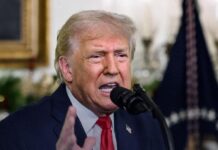
section of New York, Tuesday, Nov. 4, 2008
NEW YORK: Hundreds of thousands of immigrants could get the right to vote in New York City elections under a proposal that would mark the biggest expansion yet of efforts to enfranchise them.
The measure, aired at a City Council hearing, would make New York the biggest locale to let non-citizens cast ballots. Advocates estimate that more than 800,000 green card and visa holders would be able to help choose the mayor, council members and other city officials.
The proposal, which is in play amid a fractious debate in Washington over overhauling immigration laws, may amplify a decades-long debate over whether voting rights should be reserved for citizenship or embrace newcomers on the premise that they also have a stake in the society.
“We’re all involved in politics since we’re born. And the people who look for government to work for them have to be involved in the political process,” Dominican immigrant Jose Torrero said through a translator in an interview.
Torrero, 70, left Santo Domingo to join his daughter in New York four years ago and has a green card. He’s preparing to apply for citizenship, but it’s likely years away. He was active in politics in his homeland, and he’d like to vote for New York candidates who share his views on immigration, job creation and other issues.
While immigrant and voting-rights advocates see non-citizen suffrage as a matter of taxpayer fairness and civic engagement, some officeholders and others view the vote as a fundamental province of citizenship, a privilege to hold out as a goal for new arrivals.
“Voting is the most important right we are granted as citizens, and you should have to go through the process of becoming a citizen and declaring allegiance to this country before being given that right,” Mayor Michael Bloomberg said through a spokeswoman.
No vote has been scheduled on the measure, which faces legal as well as political questions.
In a country that describes itself as a nation of immigrants, many states once let non-citizens vote. Those policies changed by the 1930s, amid anti-immigrant sentiment and other political currents of the time, said Ron Hayduk, a Queens College political science professor who wrote a book on immigrant voting.
The idea has had something of a renaissance in recent decades. A half-dozen Maryland cities now allow it, four Massachusetts towns have OK’d it but are awaiting state approval. But immigrant suffrage initiatives were defeated at the polls in San Francisco and Portland, Maine, in 2010.
In New York City, non-citizens were able to vote for the school board for three decades, until the board was disbanded soon after Bloomberg took office in 2002.
Councilman Daniel Dromm’s proposal would open all city elections to foreigners who are in the country legally and have lived in New York City for at least six months. They would register as a separate category of “municipal voters” but would vote alongside citizens.
The idea has been floated in the council for years, but it now has more than enough sponsors to pass. Dromm says he believes there would be enough to override a mayoral veto, should it come to that.
Backers invoke a most American complaint – taxation without representation – and they note that citizenship can take a decade or more to acquire. And to some, the issue strikes at the heart of democratic ideals.
For the eight years it took Agha Saleh to get U.S. citizenship after he left Lahore, Pakistan, he felt saddened that the American “government of the people, by the people” didn’t apply to him.
“It was a dream, perhaps, this democracy of the United States,” Saleh, who helps lead a Queens community group, said at the hearing.
Advocates also say the vote would help immigrants engage with their political leaders, and vice versa.
“I think that their voices will be heard louder and clearer,” City Councilman Ydanis Rodriguez said in an interview. After immigrating from Licey al Medio, Dominican Republic, as a teenager in 1983, he taught in a public school and campaigned for local officials but couldn’t vote for them before becoming a U.S. citizen in 2000.
New York state election law prohibits immigrants from voting, and advocates and the mayor’s office dispute whether the City Council has the authority to allow it in the city. In any event, it would require federal authorities’ review for compliance with the Voting Rights Act.
City Board of Elections lawyers expressed concerns in a letter this week about the potential costs and logistics of implementing the plan, but they didn’t opine on the underlying idea.
Council Speaker Christine Quinn, who exercises considerable control over what measures come to a vote, hasn’t taken a position on the proposal. -AP






